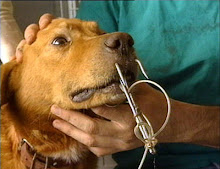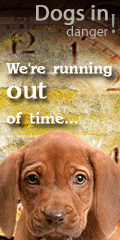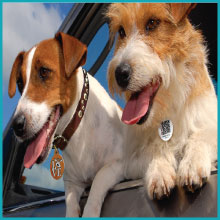National Pet Obesity Awareness Day Oct. 14, 2009 - Over Half Nation's Pets Now Overweight
"Pudgy pooches and fat cats are now the norm." states Dr. Ernie Ward, founder and President of the Association for Pet Obesity Prevention (APOP). "This is the first generation of pets that will not live as long as their parents. Even worse, the majority of today's overweight pets will endure painful and expensive medical conditions - all of which can be avoided."
"Pudgy pooches and fat cats are now the norm," states Dr. Ernie Ward, founder and President of the Association for Pet Obesity Prevention (APOP). "This is the first generation of pets that will not live as long as their parents. Even worse, the majority of today's overweight pets will endure painful and expensive medical conditions - all of which can be avoided."
To raise awareness about the dangers of pet obesity, APOP (PetObesityPrevention.com) will hold its third annual National Pet Obesity Awareness Day Wednesday, Oct. 14, 2009. On this day, hundreds of veterinarians will gather data on the waistlines of our nation's pets. Pet owners may log onto the group's website and answer questions and report their pet's size and weight.
"This year APOP has partnered with the Student American Veterinary Medical Association (SAVMA) to heighten the discussion of pet obesity at the nation's veterinary medical schools. Too often veterinarians aren't taught how to prevent obesity - only to treat the consequences," comments Ward.
"We're very excited to be working with APOP on this year's SAVMA's One Health Challenge of Obesity Awareness - both for pets and people. Obesity is a serious issue and veterinary and human medical students are eager to get involved in educating our communities about the risks for both humans and our pets." states Ryan Colburn of Michigan State University's College of Veterinary Medicine and Student AVMA Global and Public Health Officer, ad hoc.
Currently APOP estimates 50% of dogs and cats in the United States are overweight or obese (84 million). 44% of our canine companions are overweight or obese (33 million) and a staggering 57% of our cats are too heavy (51 million).
"This epidemic is needlessly costing pet owners tens of millions of dollars in unnecessary medical bills, not to mention the crippling arthritis, challenges of diabetes, and increased risk of cancer these pets endure." says Ward. "We're loving our pets to an early - and painful - death."
The biggest cause of the pet obesity epidemic? "Carbs. Today's pets consume high carbohydrate and sugar treats and foods that create changes in their brain chemistry, causing them to crave these foods even more. I call it 'kibble crack' because we're literally creating an addiction to these high-calorie carbohydrate foods," replies Ward.
What's the cure? "Everyone wants a magic pill for losing weight when the safest, cheapest and easiest cure already exists: eat less, eat healthier and exercise. Put down the biscuit and pick up a carrot; instead of feeding your cat a carbohydrate-based diet, look for a high-protein alternative. Take your dog for a walk each day. Small steps go a long way toward big weight losses."
Ward, who is also a certified personal trainer, USA Triathlon-accredited coach and Ironman athlete, offers this weight loss advice for pet owners. "Your best workout buddy is your dog. They never give excuses; any chance to get outside is a good one for a dog. Dogs and people are a perfect match in terms of aerobic abilities, dietary needs and emotions. If you're having a bad day, take your dog for a walk or jog. I may feel lousy at the beginning of a run with my dog, but I've never ended a run that way."
Health Risks associated with Obesity in Pets
1. Osteoarthritis
2. High blood pressure
3. Type 2 diabetes (cats)
4. Insulin resistance (dogs)
5. Kidney disease
6. Cancer
7. High cholesterol
8. Respiratory disease
9. Skin disease
10. Increased surgical complications
About APOP and Dr. Ward
The Association for Pet Obesity Prevention is an independent organization not associated with any veterinary pharmaceutical, pet food, or other veterinary industry organization. Dr. Ernie Ward is a licensed veterinarian, certified personal trainer, and USA Triathlon accredited coach. He and APOP help people and pets lose weight and sustain a healthy lifestyle by creating parallel weight loss and lifestyle programs.
Contact
Dr. Ernie Ward
910-579-5550
www.PetObesityPrevention.com
Student American Veterinary Medical Association
Contact
Ryan Colburn
Michigan State University
College of Veterinary Medicine
Class of 2010 Vice President
Student AVMA Global and Public Health Officer, ad hoc
616-446-4571
Sunday, October 11, 2009
Subscribe to:
Post Comments (Atom)

















1 comment:
The Association for Pet Obesity Prevention (APOP) is a group of veterinarians and veterinary healthcare experts dedicated to reducing the pet obesity epidemic.
How To Stop Dog Barking
Post a Comment